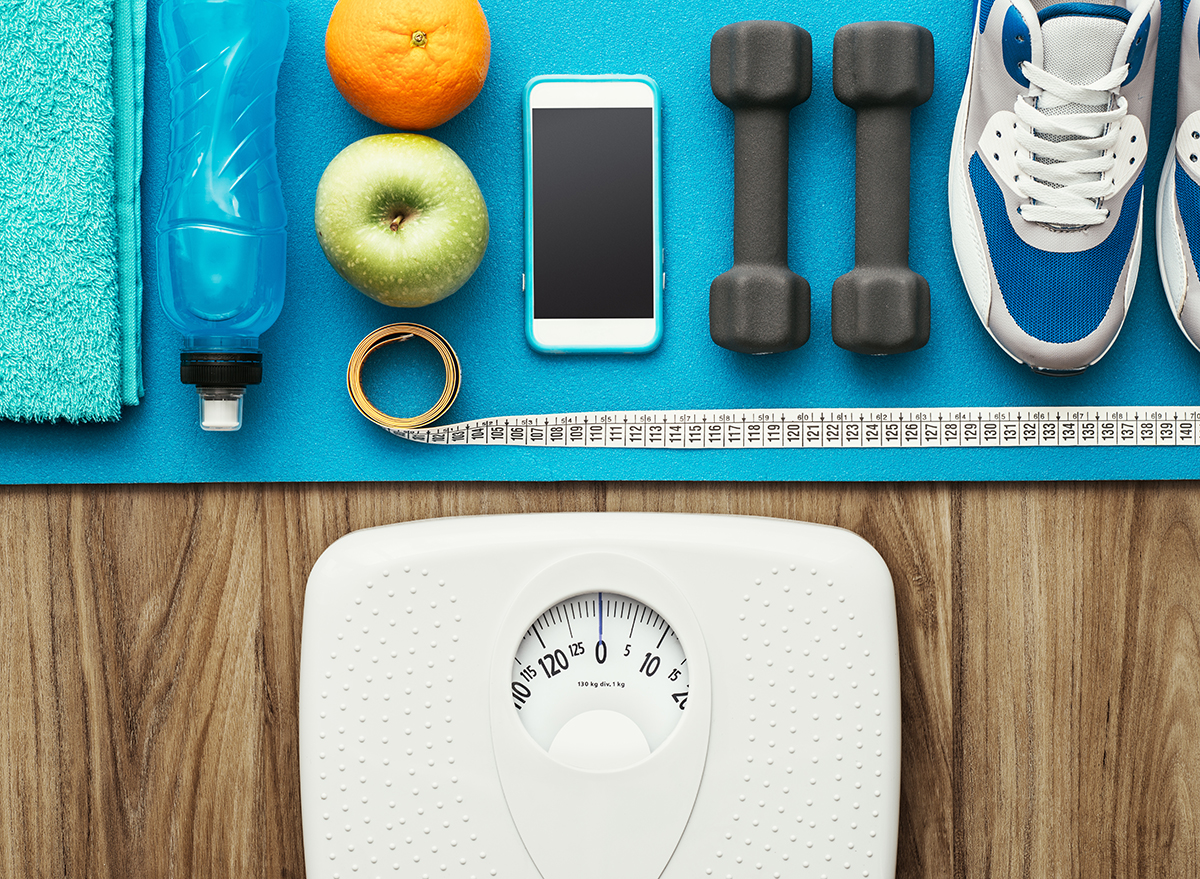Why It's So Hard to Keep Weight Off—And the Secret to Finally Losing It for Good

Many who want to lose weight have actually succeeded once or twice…or even 10 times. It happens, but losing weight only to see it creep back on is a frustrating reality for many. However, according to experts, not only is it a common problem, but it's a problem with a very real solution. That is, if you follow a truly healthy diet to lose weight the right way.
We spoke with experts to get to the bottom of exactly why losing weight is such a struggle, as well as some insight as to how exactly you can lose weight and keep those unwanted pounds off for good, thanks to a healthy diet.
Why is it so hard to keep weight off?
Losing weight is hard, but keeping it off is even harder, and according to our experts, there are a number of reasons why.
The body physically has a hard time maintaining weight loss, due in large part to the effect of the original loss on the body's metabolism. According to registered dietitian Rachel Fine, owner of To The Pointe Nutrition, any time calories are restricted, "the body learns to adapt to the self-imposed state of famine," slowing its own metabolism—and the more restrictive the diet, the worse the repercussions.
"A slowed metabolism may not bounce back after such a restrictive lifestyle," she says, "and thus creates a vulnerable landscape to future weight gain."
"They are signaling to their body that they do not need as much to function," explains Lisa Richards, nutritionist and author of The Candida Diet, who posits that in the case of someone who needs 2,000 calories a day but begins eating just 1,200 to lose weight, the original metabolism is slowed—sometimes irreversibly.
"When the restrictive diet inevitably fails and they begin eating 2,000 plus calories a day, their body is storing the 800 or more calories as fat more efficiently, because it has been taught that it doesn't need as much."
Even if weight is lost more slowly, an "energy gap" can arise.
"The new lower weight requires fewer calories to maintain than the individual was consuming before weight loss," explains Melissa Morris, ASCM-certified exercise physiologist, ISSN-certified sports nutritionist, and writer for exercise.com, noting that depending on the individual, this could mean that the body needs anywhere from 100 to 300 calories a day less than it needed before losing weight.
Some experts also ascribe to a theory of a "set point:" a weight at which our body wants to hover or return to, despite efforts to force it to lose weight. Personal trainer and weight loss expert Robert S. Herbst has experienced this first-hand in his experience as a champion powerlifter.
"My body always returns to its catchweight, to the quarter pound," he says, noting that one reason for this is that even when the body is losing weight, it does not readily lose fat cells.
"The fat cells you have just lose the amount of fat they contain," he says, and they want just one thing: to get it back. While it is possible to shift the body's set point, it's difficult to do—especially when shifting to a lower weight.
"I've seen sources say that you need at least four weeks to set a new weight," says Herbst, "but I think it takes longer."
Nutrition expert Dan DeFiglio of Beating Sugar Addiction for Dummies also notes that that adipose (fat) tissue secretes a hormone when fat is being released too quickly—and the more fat cells you have, the more hormone is released.
"So it's chemically more difficult to maintain weight loss once you've accumulated a lot of fat cells (adipocytes)," he says.
Fine agrees.
"Sharp decreases in the body's fat stores further results in hormonal deficiencies that control appetite, such as leptin," she notes. "As a result, we often see dieters chronically hungry and generally out-of-tune with their intuitive feelings of hunger and fullness."
And physiology isn't the only reason it's tough to maintain weight loss. Many people relying on overly restrictive diets or diets that cut out entire food groups eventually crack under the pressure, devouring the cookie they told themselves they couldn't have…and then ending up finishing off the entire box. Amber Stevens, nutritional health coach and mindful eating instructor, calls this the "Abstinence-Violation effect."
All of these elements combined make it very tough for anyone to sustain lasting weight loss over time.
So how can you lose weight and keep it off?
The secret to lasting weight loss all comes down to how you lost it in the first place. Sorry, but crash diets or heavy restrictions are simply bad news. According to our experts, it's imperative to lose weight in a slow, steady, sustainable way.
"A general rule is that to keep the weight off, a person must continue to do what it is that got them there in the first place," says Paul Claybrook, MBA, MS, CN, certified nutritionist at SuperDuperNutrition.com.
Dr. Melissa Davis, PhD in Neurobiology and Behavior, recommends keeping weight loss at under one percent of body weight lost per week, which will help to slowly shift the body's "set point," promoting weight loss maintenance. She also recommends adding calories back in slowly once the target weight is achieved.
"Your metabolism will ramp back up slowly after a diet, so your calorie increases should ramp back just as slowly," she says.
And while our experts agree that a calorie deficit is important for weight loss, focusing on it may be a dieter's downfall.
"I wouldn't actually recommend aiming for a specific calorie deficit as a weight loss plan," says Richards. "It's better to improve your relationship with food, eat when you're hungry, and focus on eating healthy foods."
Elise Museles, certified eating psychology and nutrition expert, agrees, recommending against removing entire food groups from your diet. She instead suggests reframing your thinking to focus on all of the delicious—healthy—things you can have.
"I think there's a place at the table for all food," she says. "It's just about being able to understand in what proportions they work best for your body. When you eat everything in balance, you're much more likely to be able to do it long-term."
She also recommends making one or two changes at a time, such as drinking more water, or having fruit for dessert—a technique similarly embraced by Arlene B. Englander, Columbia University-trained licensed psychotherapist and author of Let Go of Emotional Overeating and Love Your Food: A Five-Point Plan for Success.
"Those of us who know we need to exercise but aren't doing it every day need to sort of say, 'what do I need to do to make this happen?'" she says. "Do I need to choose another activity that I might enjoy more? Do I need to find a more fun way of doing it? Do I need to do something as simple as laying out my gym shoes and my workout wear on a chair before I go to sleep?"
For our experts, the journey towards sustainable weight loss is also a question of addressing some of the unhealthy habits that got you to an unhealthy weight in the first place.
"Is it overeating? Emotional eating? The all or nothing mentality?" Museles says. "Most people who lose weight and gain it back again, it's because they let their old ways creep back in, and they never dealt with those unwanted health or eating challenges. Until you can actually confront it and deal with it, it's always going to be an issue."
Stevens agrees.
"A long-term solution resides in understanding your 'why' around food," she says. "It's easy to say 'don't eat that cookie, it's not on the diet.' But it's sustainable to say 'why do I want that cookie? What does my body need right now?' Knowing where the craving is coming from opens the door to making empowered food choices; choosing to eat certain foods and not to eat others."
Above all, pick a plan that you know you can stick to for the rest of your life, as you're challenging yourself to make a lifestyle change.
"Make sure your diet helps you build basic habits that you can continue when you start maintenance eating after the diet is over," says Davis. "Also, remember learning a new lifestyle and new habits take time. Forgive yourself when you are not perfect and don't let imperfection make you give up. Consistency will win out in the long term for altering habits and lifestyle."








